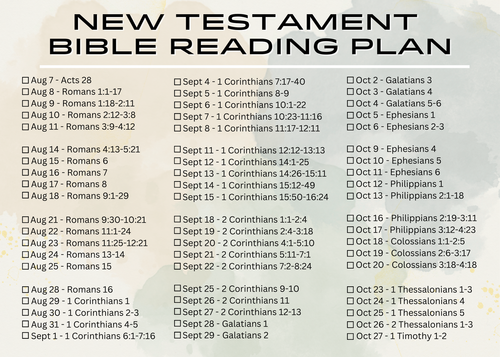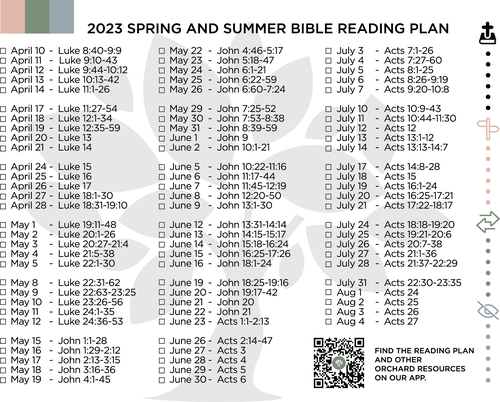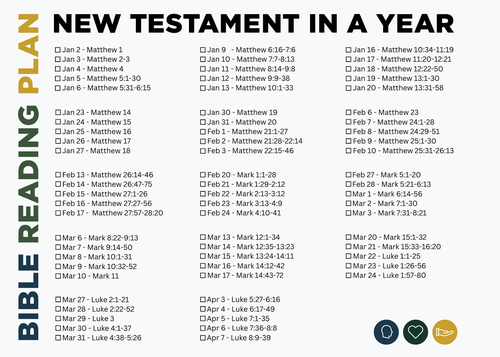A Mystery, A Doxology, And So Many Gifts
Romans 11:25-12:21
Paul explains the "mystery" of a "partial hardening," referring to the fact that not all Jews reject Jesus as their Messiah. He envisions a future when Jews embrace faith in Jesus as the promised Messiah. Verse 27 seems to support the notion that "Israel" includes new covenant believers, both Gentiles and Jews, who believe in Jesus. God's unwavering commitment is rooted in the irrevocability of His gifts and calling. The calling of God brings Israel into existence and results in an awareness of His presence and responsibility to respond. Paul parallels God's mercy on the Jews with His mercy on the Gentile Romans. Before receiving the gospel, the Romans were disobedient to God. Yet, God has shown them mercy, and Paul envisions a similar process unfolding for Jews.
Jew and Gentile alike are consigned to disobedience. The law plays a role in this, exposing human sin and holding the world accountable to God. God graciously exposes sin so that He may have mercy on all who acknowledge their sin and accept His remedy. The rest of the chapter praises God, highlighting His mercy that extends to all despite our limited understanding. Paul's gratitude for God's forgiveness fuels his deep love for the one who saved him. Human knowledge pales in comparison to God's wisdom. Offering advice to God is futile. Everything belongs to God, so Paul adds his "Amen" to acknowledge God's glory as the source and purpose of everything.
Chapter 12 begins the application of the theology of the previous eleven chapters for daily living and within the church. Using "appeal" and "brothers" reflects Paul's care. God's mercy motivates and provides a framework for everyday living. Offering ourselves as living sacrifices echoes the purpose of Old Testament sacrifices, symbolizing a personal commitment to God. This sacrifice, then and now, should be "holy and acceptable to God." The "world" refers to the present age with all its distortions and brokenness. Christian commitments involve loyalty to higher truths, differing from commonly accepted beliefs. As the gospel transforms our thinking ("mind"), we practice what we learn daily. Christian life extends beyond the church, lived out in homes, workplaces, and leisure activities.
The grace given to Paul is the same "grace given" bestowed upon God's people. God provides and calls his people to express their faith in different ways. The church's diversity and expression are willed, unified, and directed by God. Paul uses the analogy of the human body to illustrate this concept. The gifts mentioned in verse 6 are representative examples of God's grace. "Prophecy" is highlighted as the primary gift, defined by Paul as speaking to build up, encourage, and console others. "Service" refers to readiness and willingness to glorify God and assist others. "Teaching" involves doctrinal instruction aligned with Scripture. Other gifts mentioned include "exhortation" or encouragement, "contribution" or generosity towards others' needs, "leadership," and "acts of mercy" paired with "cheerfulness." Love clings to "what is good" and abstains from evil. Our affection is expressed with true devotion.
"Tribulation" leads to hope associated with God's love. Hope is the sphere for rejoicing. Love fosters confidence in God that facilitates joyfulness. Consistency in prayer is essential. Giving to the needy is an expression of God's love. Sharing meals and lodging with strangers is part of early church culture and honors Jesus' call to meet the needs of the hungry and thirsty.
The gospel enables a higher response to persecution, although decisions should consider the context. Sometimes Paul endured arrest and harsh treatment; other times, he moved to the next town. Loving others means empathizing in joyful and sorrowful times. Rejoicing with those who rejoice and weeping with those who grieve demonstrate godly love. However, Christian congregations can be breeding grounds for strife, which concerns Paul. Love enables harmonious living. Divisions should be addressed and overcome. The gospel should eliminate haughty attitudes and behavior.
Believers should not repay evil with evil. Instead, they should anticipate challenging situations and respond generously. Paul exhorts believers to live peaceably with all within the boundaries of non-negotiable truths. Understanding "avenge yourselves" can be complex, especially in regions where violence targets Christians. Paul's counsel here primarily focuses on personal ethics rather than political policies or counter-war strategies. Paul thinks broadly about how Christians should show kindness to those unfriendly towards the gospel, including themselves, and he draws on Proverbs 25:21-22, emphasizing that simple acts of hospitality can shame detractors. By actively embracing the grace of the gospel and living a life ruled by love for God, we ensure that good, as measured by God, prevail over evil in our lives.
Jew and Gentile alike are consigned to disobedience. The law plays a role in this, exposing human sin and holding the world accountable to God. God graciously exposes sin so that He may have mercy on all who acknowledge their sin and accept His remedy. The rest of the chapter praises God, highlighting His mercy that extends to all despite our limited understanding. Paul's gratitude for God's forgiveness fuels his deep love for the one who saved him. Human knowledge pales in comparison to God's wisdom. Offering advice to God is futile. Everything belongs to God, so Paul adds his "Amen" to acknowledge God's glory as the source and purpose of everything.
Chapter 12 begins the application of the theology of the previous eleven chapters for daily living and within the church. Using "appeal" and "brothers" reflects Paul's care. God's mercy motivates and provides a framework for everyday living. Offering ourselves as living sacrifices echoes the purpose of Old Testament sacrifices, symbolizing a personal commitment to God. This sacrifice, then and now, should be "holy and acceptable to God." The "world" refers to the present age with all its distortions and brokenness. Christian commitments involve loyalty to higher truths, differing from commonly accepted beliefs. As the gospel transforms our thinking ("mind"), we practice what we learn daily. Christian life extends beyond the church, lived out in homes, workplaces, and leisure activities.
The grace given to Paul is the same "grace given" bestowed upon God's people. God provides and calls his people to express their faith in different ways. The church's diversity and expression are willed, unified, and directed by God. Paul uses the analogy of the human body to illustrate this concept. The gifts mentioned in verse 6 are representative examples of God's grace. "Prophecy" is highlighted as the primary gift, defined by Paul as speaking to build up, encourage, and console others. "Service" refers to readiness and willingness to glorify God and assist others. "Teaching" involves doctrinal instruction aligned with Scripture. Other gifts mentioned include "exhortation" or encouragement, "contribution" or generosity towards others' needs, "leadership," and "acts of mercy" paired with "cheerfulness." Love clings to "what is good" and abstains from evil. Our affection is expressed with true devotion.
"Tribulation" leads to hope associated with God's love. Hope is the sphere for rejoicing. Love fosters confidence in God that facilitates joyfulness. Consistency in prayer is essential. Giving to the needy is an expression of God's love. Sharing meals and lodging with strangers is part of early church culture and honors Jesus' call to meet the needs of the hungry and thirsty.
The gospel enables a higher response to persecution, although decisions should consider the context. Sometimes Paul endured arrest and harsh treatment; other times, he moved to the next town. Loving others means empathizing in joyful and sorrowful times. Rejoicing with those who rejoice and weeping with those who grieve demonstrate godly love. However, Christian congregations can be breeding grounds for strife, which concerns Paul. Love enables harmonious living. Divisions should be addressed and overcome. The gospel should eliminate haughty attitudes and behavior.
Believers should not repay evil with evil. Instead, they should anticipate challenging situations and respond generously. Paul exhorts believers to live peaceably with all within the boundaries of non-negotiable truths. Understanding "avenge yourselves" can be complex, especially in regions where violence targets Christians. Paul's counsel here primarily focuses on personal ethics rather than political policies or counter-war strategies. Paul thinks broadly about how Christians should show kindness to those unfriendly towards the gospel, including themselves, and he draws on Proverbs 25:21-22, emphasizing that simple acts of hospitality can shame detractors. By actively embracing the grace of the gospel and living a life ruled by love for God, we ensure that good, as measured by God, prevail over evil in our lives.





Recent
Archive
2023
January
Happy New Year!He Will Save His People From Their SinsMy Beloved SonTemptation And MinistryThe SermonLeaving, Lying, Limits, Love, Largesse, and The Lord's PrayerTreasure, Anxiety, and JudgmentAstonishing AuthorityStorms, Demons, and HealingJesus Is CompassionateHis Eye Is On The SparrowSwords, Rewards, and MessengersThe Lord of the SabbathBlasphemy, Bad Trees, Signs, and FamilyStories, Sowers, and SoilsParables, Hidden Treasure, and RejectionFame, Food, Fear, Faith, and FringeReal Issues And The Power Of GodDying To Find LifeLike The SunChildren, Temptation, Sheep, And ForgivenessMarriage, Kids, And MoneyTo Serve And Give His Life
February
The ArrivalStories That StingQuestion TrapsHidden Motives And LamentThe End...?UnexpectedReady?Punishment, The Plot, And PerfumeTreachery, Passover, and The CupBetrayal, Injustice, And DenialThe Field Of Blood And The GovernorCrucifixion And DeathAll AuthorityMark—The Beginning Of The GospelHealing, Preaching, And The Forgiveness Of SinEating With Tax Collectors, Fasting, The Sabbath, And An Escape BoatThe Twelve, Blasphemy, Family, And A ParableParables And PowerA Different Kind Of StormPower Had Gone Out
March
Death, Hunger, And MiraclesCommandment Or TraditionDo You Not Yet Understand?The Christ And A Glimpse Of His GloryUnbelief, Confusion, And SinDivorce, Children, And PossessionsTo Give His Life As A RansomHosannaThe Rejected Stone, Taxes, And The Great CommandmentDestruction And The EndNo One Knows, An Anointing, And A Promise To BetrayPassover And GethsemaneThe Kiss, Arrest, And DenialPilate, Simon, And The CrucifixionDeath, Burial, Resurrection, And What\'s NextTheophilus And A Visit From GabrielMary And The MagnificatBenedictusThe Arrival And The ShepherdsSimeon, Anna, And The SpiritFruits Keeping With Repentance And BaptismThe Wilderness, Nazareth, And CapernaumSimon's Mother-In-Law, Fishing, A Leper, And Sins
April
Tax Collectors, Fasting, Sabbath Controversies, And The TwelveWhy Do You Call Me Lord, Lord?Jesus Marveled, A Raised Son, And QuestionsA Sinful Woman And A ParableObeying The Word, A Storm, And DemonsTwelve Years, Twelve Apostles, And SpeculationGreater, Costly, And GloryNot Getting It, The Cost, And AppointedWoes, Neighbors, And What Is NecessaryHelp Us Pray And A Divided Kingdom?Signs, Lights, And WoesHypocrisy, Fear, A Fool, And AnxietyParables, Division, And The TimesWarnings, A Daughter Of Abraham, And Jerusalem, JerusalemA Son Or An Ox, Parties, And DiscipleshipLost ThingsThe Dishonest Manager, The Law, And Anguish In This FlameMillstones And Mustard SeedsPersistent Prayer, Humility, A Childlike Faith, And The Rich RulerEverything That Is Written, A Blind Beggar, And A Wee Little Man
May
A Parable, A Colt, A Prophecy, And A CleansingAuthority, Wicked Tenants, And TaxesThings To Beware Of And WidowsDestruction, Persecution, The Son Of Man, And WatchingThe Plot, Betrayal, Lord's Supper, And Inappropriate BehaviorPrediction, Fulfillment, Agony, Betrayal, And DenialMistreated, Taken Before The Council, Pilate, Herod, And Delivered To Be CrucifiedCrucifixion, Death, And BurialHe Is Not HereDisbelieved For JoyIn The Beginning…The Lamb Of God And A WeddingZeal, What's Inside, And Born AgainHe Must Increase
Categories
no categories
Tags
no tags
